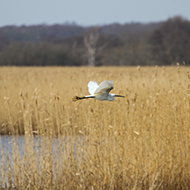Avian flu outbreak at RSPB Minsmere

The 2,500-acre reserve has sadly confirmed the outbreak.
RSPB Minsmere nature reserve in Suffolk has confirmed an outbreak of highly pathogenic avian influenza on its site. The coastal nature reserve has seen an increase in dead birds recently, and has said that it is 'extremely concerned' about the potential impacts on bird populations, with 2021 and 2022 seeing the largest ever outbreak in the UK.
In a statement, RSPB said: “We appreciate that it is distressing, for both visitors and staff, to see dead or dying birds at our site but we ask that if visitors see any dead or unwell birds, they do not touch or go near them and that they report it to us at our Visitor Centre during its opening hours, or by emailing us on minsmere@rspb.org.uk outside of these times.”



 The Animal and Plant Health Agency (APHA) has updated its online reporting service for dead wild birds.
The Animal and Plant Health Agency (APHA) has updated its online reporting service for dead wild birds.